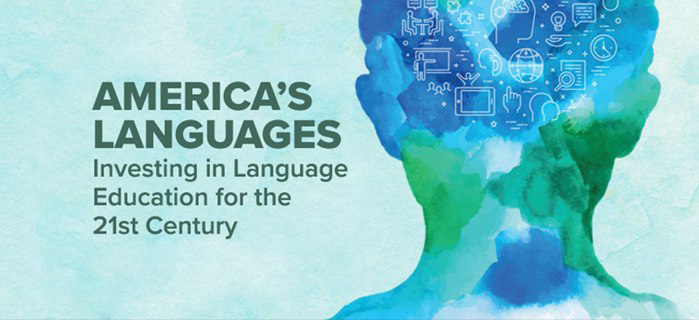The Commission on Language Learning, formed by the American Academy of Arts & Sciences (the Academy) in 2015 to evaluate the state of foreign language learning as a response to a bipartisan request from the US Congress, released the first comprehensive report on US language education in decades. To unveil its findings, the Academy hosted a public discussion and panel at the National Press Club in Washington, D.C. as well as a series of meetings with members of Congress and representatives of the education community.
America's Languages: Investing in Language Education for the 21st Century makes use of current research on language acquisition and attrition, data collection, and professional expertise to offer a series of recommendations for schools, colleges and universities, community organizations, philanthropists, businesses, government agencies, students and parents to prepare citizens who can thrive in the 21st-century.
American Councils President Dr. Dan E. Davidson serves on the Commission on Language Learning, a 17-member group chaired by Columbia University's Paul LeClerc, which was formed by the Academy to gather data, collect testimony, and discuss opportunities for improving the nation's capacity in non-English languages in an effort to inform future policy-making decisions around language learning and education more broadly in the United States.
"What this report does remarkably well is to counter with well-grounded, policy-oriented recommendations several of the most persistent myths that affect the way many Americans view the study of world languages. Among them, are views that one language, English, is sufficient to function effectively in today's world, or that technology has obviated the need for ordinary citizens to know another language, or, that Americans simply aren't very good at learning foreign languages," Dr. Davidson noted. "I think the broad base of up-to-date information and carefully considered recommendations of the new report will be helpful not only to policy makers, but to parents, teachers, school boards and universities, as they consider the value of language as a national need on par with mathematics or English, and can assure that access to language study is available to all Americans."
The America's Languages report draws on the Commission's initial research, The State of Languages in the US: A Statistical Portrait (2016), which offers a quantitative analysis of language capacity in the country, to recommend a national strategy to improve access to languages for people of every region, ethnicity, and socioeconomic background and to value language education as a national need similar to education in math or English.
"The new report spotlights existing best practices in language study around the US, while noting considerable variation at the state and school district level as far as public investments in foreign language study are concerned," Dr. Davidson commented. "The report also points out examples of K-8 dual-language immersion programs that are producing systematic positive outcomes on student performance across subjects, as well as examples of colleges and universities that offer integrated overseas immersion programs for all qualified students."
The 2017 final report emphasizes four key areas of focus in order to bolster national language education: building educational capacity, involving local communities, businesses, and philanthropies, developing heritage and Native American languages, and encouraging international study and cultural immersion.
Download the Report
Download a copy of the official report here.

